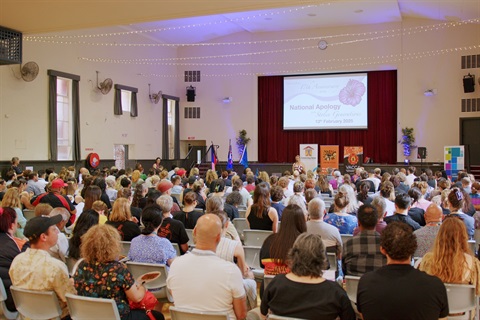National Apology Day Commemoration 2025
Published on 20 February 2025

On Thursday 13 February, the community came together to commemorate the 17th Anniversary of the 2008 National Apology to the Stolen Generations by the Australian Government.
The speakers shared their experience of some of the effects the policy of forcibly removing children from their families had on them, their family and their community to a packed audience at the Preston Town Hall. The video screening of the 2008 National Apology to the Stolen Generations was played followed by music, then a ceremony at the Stolen Generations marker. The event was organised by Link-Up Victoria, in partnership with Connecting Home and City of Darebin.
Bunurong Land Council board member and reserved seat holder on Victoria's First Peoples' Assembly and Connecting Home deputy co-chair Zoe Upton reflected how the anniversary affects her community deeply.
‘Every time I see that video I’m reminded of how important it was to the people,’ she said.
Victorian Aboriginal Child and Community Agency chief executive Aunty Muriel Bamblett said the apology was an enormous step towards truth telling.
‘We wanted a sorry that finally told the truth about what happened to us. A sorry that meant so much to so many of us,’ she said.
‘Today is about giving voice to the Stolen Generations. It’s not about making people feel guilty.’
Mutti Mutti songman and Stolen Generations survivor Uncle Kutcha Edwards said ‘this isn’t just another day. You want it to be just another day and realistically it’s not.’
After the speeches, and songs from Uncle Kutcha Edwards, everyone moved outside to the Stolen Generations marker and heard from members of the Stolen Generations. They spoke about the pain and suffering they experienced after being forcibly removed from their families and culture. Members mentioned the hardships that followed their removal, such as suffering abuse in their new foster homes, their journey to reunite with family, and how connection could be hard when you are stolen. Some of the Stolen Generation also experienced their children being stolen. One woman spoke of her mother who still feels the pain of her children being taken today as if it were yesterday. In every story the pain was palpable and the message of how it has affected generations was strong. One man said ‘We come to the spaces to heal. Allow us spaces to cry. Allow us spaces to be angry because this journey is difficult.’
For more information about the formal apology to Australia’s Aboriginal and Torres Strait Islander people, particularly the Stolen Generations, on behalf of the nation at Australian Parliament House, visit:
Parliament of Australia website